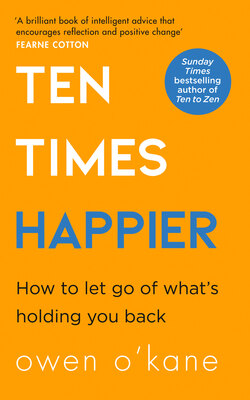Читать книгу Ten Times Happier - Owen O’Kane - Страница 20
WHY YOU BECOME STUCK
ОглавлениеI believe that most human distress relates to what goes on in our minds. Regardless of the event, how we feel about it always links back to how our minds interpret it. That will always vary from person to person. Going on a roller coaster terrifies me, whereas my partner behaves like an excited child! Essentially, it’s difficult to live a happy life if you haven’t got a handle on your mind.
A client, Nick, who was struggling with anger issues and depression, described in a session with me an event in his life that perfectly illustrated this. One day, he was driving to work and he encountered a delay at a railway level crossing. Nick was only one car away from getting past the gate but just as he approached, the gate came down and he was forced to stop. Even though it is standard procedure for a gate to block traffic crossing the rail tracks when a train is passing through – in fact, it’s vital for safety – he was furious. He got out and started to scream at the car in front of him for not driving fast enough. He kicked the gate at the level crossing and then returned to his car to persistently sound his horn until the train had passed and the gate was raised.
When we explored his actions, Nick was able to reflect that, at the time, his mind felt ‘as if it were going to explode’. He wanted to get to his destination quickly and his mind was telling him:
• This is just your bad luck
• This shouldn’t be happening
• You will be late getting to work
• Why do trains get priority?
• The driver in front of you caused the problem
• This isn’t fair.
Nick had listened to these thoughts, started to engage with them and then responded by screaming, jumping out of his car, and sounding his horn continuously.
In this moment Nick’s mind was inappropriately in threat mode. His amygdala, the centre in the brain that protects us from danger, was telling him there was a threat and he should react accordingly. There wasn’t any real danger but his threat system reacted because something hadn’t gone to plan. But by following the steps outlined on pages 47–9, Nick could have had a very different reaction. If Nick had allowed himself time and space to acknowledge but not to engage with the content of his mind, his thoughts would have been quieter and more flexible, and would perhaps have played out something like this:
• That’s a shame but it’s OK, I can wait
• Better to be safe than have an accident
• I’ll listen to the radio while waiting.
The more Nick is able to practise this approach, then the easier it becomes for him longer term.
Can you see the difference in his thoughts? And how they in turn would have produced a very different reaction, too? If we believe everything our minds tell us it won’t always produce a rational, sensible outcome.
